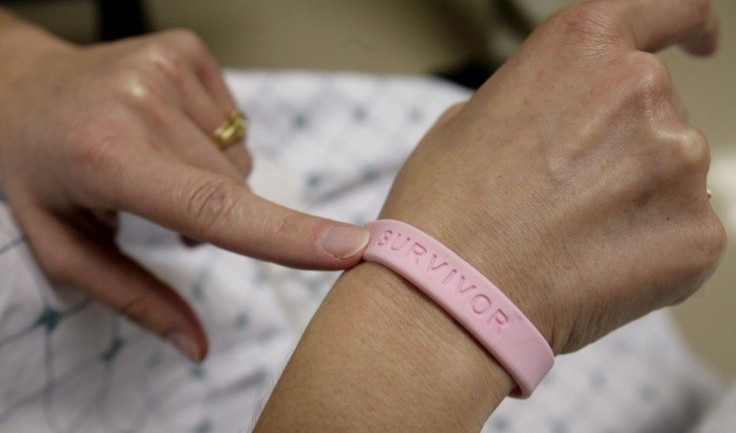Breast Cancer Test Could Spot Disease A Decade Earlier

A new genetic test may be able to predict breast cancer up to a decade before it is diagnosed, according to a new study.
Researchers from Imperial College London analyzed the blood of study participants for the presence of certain genetic factors that could indicate a higher risk of breast cancer, finding that high levels of a genetic switch that modifies a single gene on white blood cells, found in 20 percent of women, more than doubles their risk of developing breast cancer.
They said they hope to make the blood test used in the study widespread and use it as an effective and simple way to predict breast cancer.
We know that genetic variation contributes to a person's risk of disease, Dr. James Flanagan, study author and epigenesist at Imperial College London, told BBC News. With this new study we can now also say that epigenetic variation, or differences in how genes are modified, also has a role.
After skin cancer, breast cancer is the most common form of cancer in women. Over 200,000 women are diagnosed with the disease annually, according to the American Cancer Society.
Researchers said it's not clear precisely how a change in a white blood cell gene raises the risk of breast cancer but said there is a clear correlation between the genetic switch and the cancer risk. They analyzed blood samples of over 1,300 women, 640 of whom eventually developed breast cancer. Women who had high levels of the genetic switch were twice as likely to develop the disease compared to women who had low levels, according to the study.
On average, women showed higher levels of the genetic switch three years before they were diagnosed with breast cancer, but in some cases, researchers found the higher levels up to 11 years before the initial diagnosis.
By combining a blood test that screens for the genetic switch with other risk factors, researchers hope they can identify women who are at the highest risk of developing breast cancer and begin preemptive treatment. They said a blood test could be available within 5 years, but could not estimate how much the test would cost.
Other risk factors for breast cancer include a family history of the disease, being older than 55, being overweight and being exposed to radiation, according to the Mayo Clinic.
We are working towards prevention, Flanagan told the Telegraph. If we can identify women at high risk of cancer we can work towards preventing it and could reduce the incidence of breast cancer quite dramatically.
Women who are at a high risk could opt for a preventive mastectomy, a surgery in which doctors surgically remove both breasts to stop cancer from emerging. Women with the genetic mutation BRCA1 or BRCA2, which increases the risk of breast and other cancers by up to 60 percent, often opt for preemptive mastectomies, according to WebMD.
A woman with a BRCA1 or BRCA2 alteration is at higher risk for developing breast, ovarian, and other cancers than a woman without an alteration, the National Cancer Institute says on its website. However, not every woman who has an altered BRCA1 or BRCA2 gene will get cancer, because genes are not the only factor that affects cancer risk.
Testing for BRCA1 or BRCA2 is simple -- you only need to give a blood sample. However, the price can be steep and depending on a patient's family history of breast cancer, it is not always covered by health insurance, according to the NCI.
While the test cannot say definitively whether a woman will develop breast cancer or not, it is effective at identifying an increased risk, according to the NCI -- which can help women make informed decisions about preventive healthcare
Testing for breast and ovarian cancer risk will not give you a simple 'yes' or 'no' answer, the organization says on its website. If a gene alteration is found, this will tell that you have an increased risk of getting cancer, but it will not tell if or when cancer will develop. If an alteration is not found, it still is no guarantee that cancer won't develop.
Delyth Morgan, chief executive of Breast Cancer Campaign, a breast cancer advocate organization based in the U.K., told the Telegraph that Flanagan's study research is exciting because it raises the possibility that cancer could be diagnosed early, meaning intervention treatments could begin sooner.
We can look at ways of preventing the disease and detecting it earlier to give people the best possible chance of survival, she said.
The journal Cancer Research published the study in its April edition
© Copyright IBTimes 2024. All rights reserved.





















